David Jankoviak's Story
 David Jankoviak works as a Lieutenant/Assistant CERT Leader at PA Department of Corrections/SCI Phoenix.
Learn about his career and the role his Rosemont education played in expanding both
his knowledge of the field and on-the-job skills.
David Jankoviak works as a Lieutenant/Assistant CERT Leader at PA Department of Corrections/SCI Phoenix.
Learn about his career and the role his Rosemont education played in expanding both
his knowledge of the field and on-the-job skills.
Who is your current employer and what is your position?
Lieutenant/Assistant CERT Leader at PA Department of Corrections/SCI Phoenix.
What do you love about your job?
As the Assistant Correctional Emergency Response Team Leader (CERT-highly specialized team trained in lethal and less-than-lethal weaponry for riot control, building entry, and room clearing) I love the comradery of being a member and leading a tight-knit team. Corrections is extremely challenging; every day is different, and things can go from good to dangerous quickly. There is a diversity in staff. We may not agree all the time, but in an emergency, everyone comes together as one team. If you want to specialize in different aspects of corrections (defensive tactics, CPR, suicide prevention, de-escalation techniques, to name just a few) the training is ahead of the curve compared to other agencies. I also enjoy passing along the things I have learned over the past 24 years to the newer staff.
What was your best experience on the job?
Being a part of the Phoenix transition team. I was assigned as a Subject Matter Expert for Immediate Response Teams (IRT-designated on-site staff assigned to respond to emergencies) and CERT operations. I helped prepare the new state-of-the-art State Correctional Institution at Phoenix to open to receive staff and inmates in preparation of the closure of SCI Graterford. I learned different aspects of corrections beyond the regular duties of running an institution. I also made connections with people from different state agencies, government officials and businesses. For the transition itself, I served as the liaison between all the specialized teams on-site (CERT, Hostage Rescue, Correctional Rifle Specialist, K-9) and the Command Center. We moved 2,500 inmates from Graterford to Phoenix in five days. It was a monumental undertaking.
Why did you choose Rosemont College?
My wife is a double alumna and legacy, and my mother-in-law is an alumna as well. I would enjoy attending events on campus with my wife. I loved the small, quiet campus; everyone is always so welcoming. Rosemont’s School of Graduate and Professional Studies has a good reputation and offers the field I am interested in. The fact that Rosemont’s Criminal Justice and Homeland Security program is affiliated with the Naval Postgraduate School’s Center for Homeland Defense and Security was a key component in my decision to attend the College.
What has been your best Rosemont experience so far?
I really enjoy the discussion forums between students because they allow for further research on a topic, and you must defend your point of view. You get different perspectives from other students -- ones you might not have thought of or agree with, and I have had my point of view changed by some of their arguments. Keeping an open mind is critical.
How was your experience with the faculty?
Excellent. Everyone is extremely helpful, not just the professors, but the advisors, directors, librarians, and admissions and financial aid staff. The professors are knowledgeable and have real-world experience; they are not just teaching from a textbook. The professors are also understanding with the challenges of juggling family, career, and school. They truly want you to succeed.
Favorite class?
Understanding Terrorism. I am pursuing a concentration in Homeland Security. I thought I had a pretty good understanding of terrorism just by following current events and my own reading, but ut the Terrorism class really opened my eyes to the vastness of the field and introduced me to more resources that I did not know existed.
Why would you recommend Rosemont to your peers?
The curriculum is extremely relevant to today’s society. The smaller classes allow you to form better relationships with the professors and your peers. The college really wants you to succeed in your education. You aren’t just another number.
How has Rosemont helped you advance in your career?
Continuing my education at Rosemont has enhanced the ongoing development of my critical thinking and problem-solving skills, something that’s important in corrections as every day in a new institution presents challenges. Situations can change drastically in seconds; you must remain fluid and be able to make spilt-second decisions. It has also helped me in my report writing and interviewing skills. The curriculum challenges you; the research, discussions and written assignments keep these skills sharp. These all have contributed to honing my time-management skills, helping me find the right balance between family, career, and school. Continuing to be challenged by ongoing learning keeps you mentally sharp, on top of your game, and allows you to function at your best capacity.
